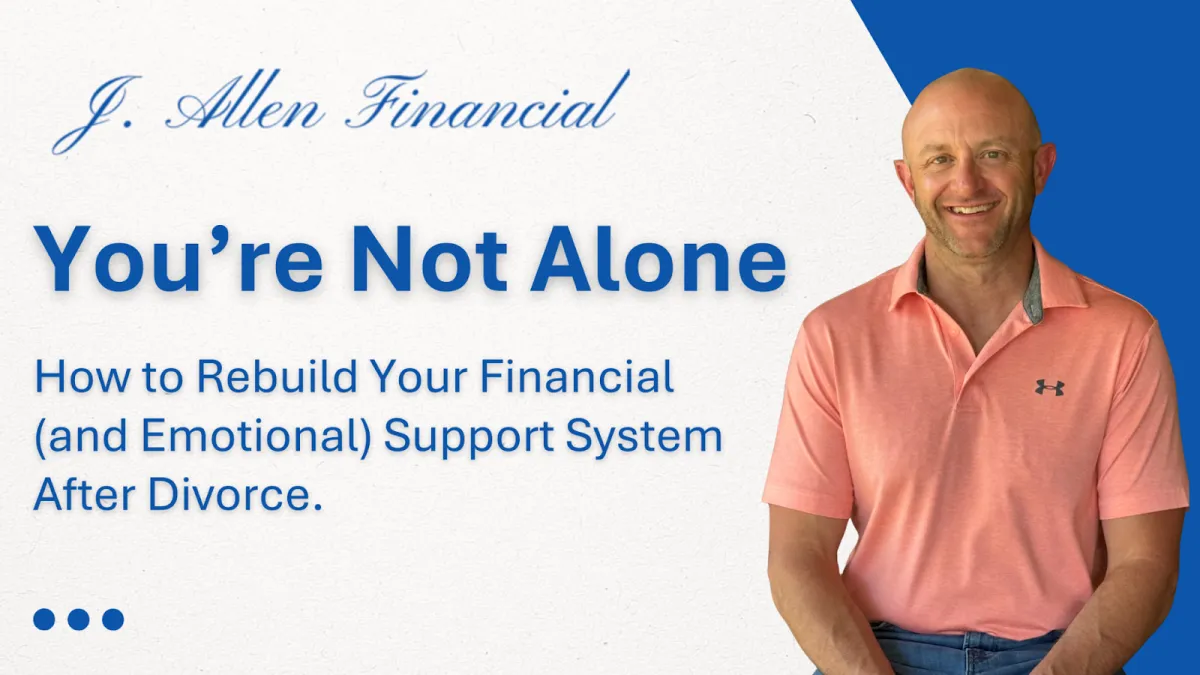
You’re Not Alone: How to Rebuild Your Financial (and Emotional) Support System After Divorce
By Judd Allen, CDFA® Candidate
Divorce is not only a legal and financial process. It is a deeply personal transition that often leaves people feeling unmoored. Even strong, successful professionals describe the aftermath as isolating. The routines are different. Friendships shift. The home feels quiet in a way that stings.
Amid this emotional change, the financial side can feel equally overwhelming. Questions about retirement, housing, and supporting children press in from every angle. Rebuilding both emotional and financial support systems is not just helpful. It is essential.
Why Financial Recovery Requires Community
Money is never just about numbers. It is about security, opportunity, and the ability to live with confidence. Trying to rebuild finances in isolation is like trying to lift a heavy object alone. It may be possible, but it is unnecessarily exhausting.
A strong support system provides both accountability and perspective. Friends can listen. Therapists can help process the emotional fallout. Attorneys can clarify legal obligations. A financial advisor can help map out a strategy for the future. Each plays a role in helping you move forward with clarity.
Identifying the Right Kind of Support
Not all support is helpful. Well-meaning friends may offer advice that does not apply to your circumstances. Some may urge risky decisions out of loyalty or emotion. Be selective about who you turn to for financial guidance.
Seek professionals who understand the unique challenges of post-divorce planning. Look for advisors who specialize in working with clients navigating transitions. Choose a therapist who recognizes the link between financial stress and emotional health. The right support system will not just cheer you on. It will help you make sound decisions.
The Role of Professional Networks
For business owners and executives, divorce often complicates professional life as well. Building a reliable network of professionals can reduce stress and open new opportunities. Accountants, insurance specialists, and estate planners each bring expertise that fills critical gaps.
The key is integration. A coordinated team that communicates well ensures your tax plan, retirement plan, and estate plan align. This integration minimizes costly mistakes and creates confidence that your financial life is working in harmony.
Reconnecting with Community
Isolation is one of the most common and overlooked effects of divorce. Rebuilding community ties plays a direct role in financial recovery. Support groups for divorced men and women provide encouragement and understanding. Networking events can lead to both friendships and professional opportunities. Volunteering or engaging in hobbies restores a sense of normalcy and purpose.
The more supported you feel, the stronger your decision-making becomes. Financial choices made from a place of connection are often wiser than those made in loneliness or fear.
Guarding Against Overdependence
While support systems are essential, leaning too heavily on others can create new challenges. Financial independence means owning your decisions and understanding your plan. Advice is valuable, but ultimately, you must be the one steering the ship.
Balancing input with self-confidence is the goal. A financial plan you understand and believe in provides both structure and autonomy.
Building Emotional Resilience Alongside Financial Strength
Emotional recovery fuels financial resilience. Divorce may shake your confidence, but each small victory restores it. Setting and sticking to a new budget, making your first retirement contribution post-divorce, or paying down a balance are all wins worth celebrating.
Therapy, fitness, mindfulness, or spiritual practices can strengthen the mental and emotional side of recovery. As confidence grows, financial decisions become less stressful and more intentional.
Finding Strength in the Second Chapter
Divorce often feels like an ending. In truth, it is the start of a new chapter. Rebuilding both financial and emotional support systems lays the foundation for this next phase of life. You do not need to have every answer right now. You need a structure, a team, and the willingness to take the next step.
Moving Forward With Strength
Support systems do not erase the challenges of divorce, but they make the load lighter. Financial progress becomes more manageable when you have advisors, peers, and friends walking alongside you. Emotional recovery becomes less lonely when you allow trusted people into your journey.
This combination - financial structure and emotional resilience - does more than steady the ground. It allows you to rebuild not only your finances but also your confidence, dignity, and sense of belonging.
